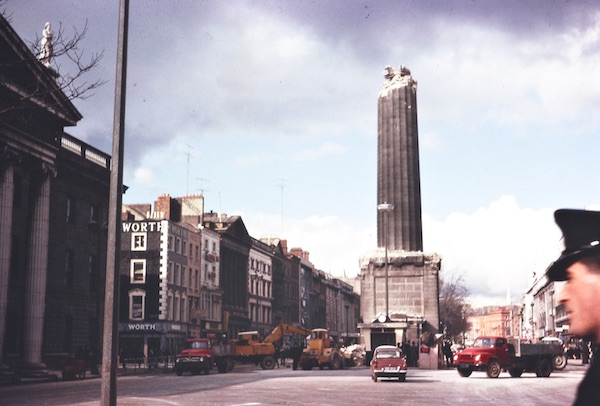
A monument to a British imperialist in the centre of Dublin, Nelson’s Pillar on O’Connell Street, was blown up by republicans fifty years ago this week.
For many, the biggest surprise about the blowing up of Nelson’s Pillar in Dublin in 1966 is why it took 157 years.
When the pillar was constructed circa 1808 the Protestant Ascendency class who had erected it celebrated. To them Vice-Admiral Horatio Nelson was a once in a lifetime hero, the man who at the Battle of Trafalgar in 1805 had turned the tide against Napoleon.
But after Irish independence was won his presence and preeminence atop the 120 foot high pillar became increasingly controversial. He had been famously cold hearted and an adulterer, some said. Why not have an Irish patriot replace him, they asked?
In the early hours of the morning of March 8, 1966 a huge explosion rocked central Dublin and the top half of the pillar was blown sky high.
Later the Irish Army was sent in to finish the job with a controlled explosion. Some men were later arrested but never charged. Dublin quickly adjusted to the missing monument.
“Gaiety and joie-de-vivre prevailed throughout O’Connell Street,” The Irish Times reported the following day.
“There were happy, smiling faces everywhere and witticisms like ‘poor old Nelson’ were greeted with roars of laughter.”
The newspaper’s editorial writer was less amused, criticising the “tepid” response of minister for justice Brian Lenihan to this “coup in the heart of the capital city”.
‘Up Went Nelson’, a folk song set to the tune of The Battle Hymn of the Republic and recorded days after the explosion, went to the top of the Irish charts and stayed there for four weeks.
The man who says he blew up the pillar in 1966, Liam Sutcliffe, was questioned by gardai in September 2000. He was released and the matter was taken no further.
He said the idea to blow up the statue came during a discussion in the Cosy Bar on the Crumlin Road, Belfast.
“I was having a drink with an old friend at the time. The 1916 Rising was being marked with functions and dinners and the [IRA’s border campaign] was fizzled out,” he said.
“We thought the Rising should be marked with something a bit more dramatic and my friend’s sister-in-law said it was shocking to see a British admiral in O’Connell Street. So I said we should remove it.”
He suggested it to a senior member of the republican movement, who initially thought it would be too dangerous but then agreed it would be a good idea.
“The first attempt was on the last day of February but the bomb didn’t go off. So I had to go up on March 1st and remove it. I went into Clery’s, bought a nail clippers and stripped it. I had a week then to drop it back. I went back on March 7th, had electrics in a briefcase. I connected everything up and placed it in an aperture - one of the widows at the top - that looked up Henry Street.
“I shook the hand of the man up guarding the platform and said ‘Cheerio’. He went off after his shift that night and the bomb went off at 1.32 in the morning. I had it timed for 2 am but I had it on fast and it gained 28 minutes.”
Asked whether he saw the bomb go off, he said: “I did not. I was at home tucked up in bed. I didn’t know it had gone off at all until I saw it on the front page of the paper that morning.”
He was “delighted” and thought the pillar would be replaced with a statue of the seven signatories of the Proclamation facing the GPO.
“I thought they would have done that. In Ireland there’s not even a statue of Pearse. In all other former colonies they honour the men who got up and said ‘No further shalt thou go’.”
![[Irish Republican News]](https://republican-news.org/graphics/title_gifs/rn.gif)
![[Irish Republican News]](https://republican-news.org/graphics/title_gifs/harp.gif)

